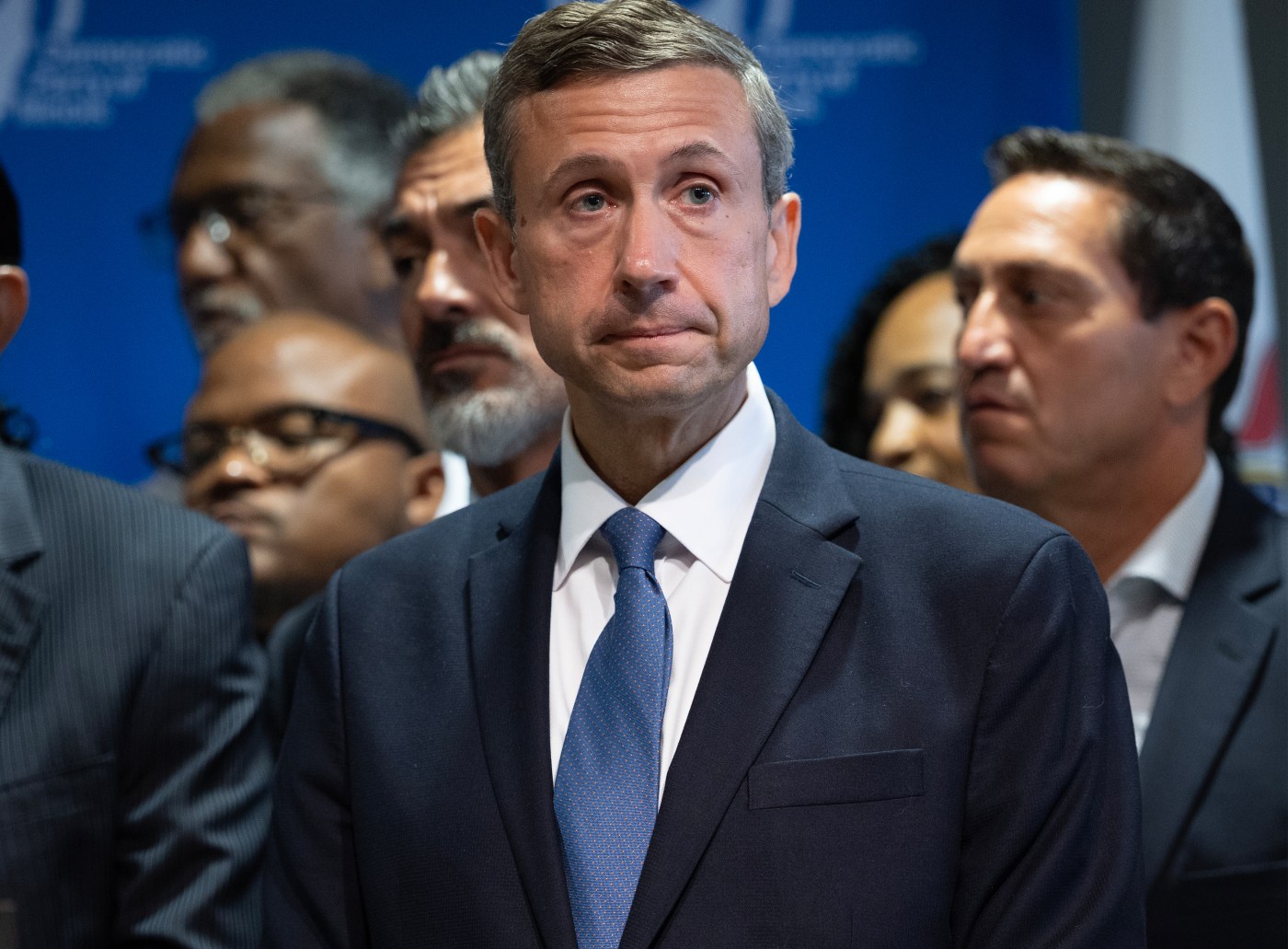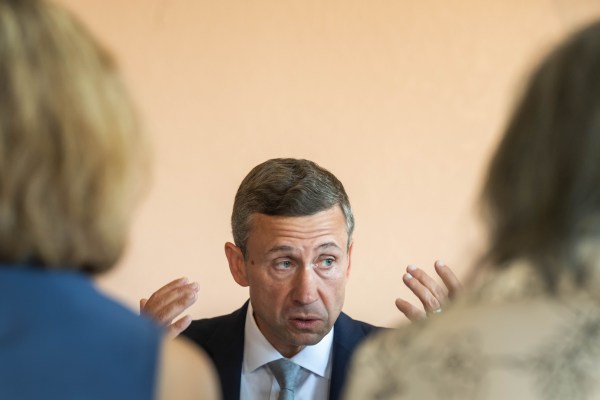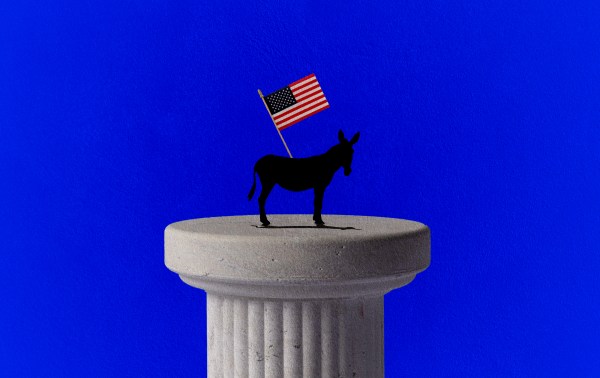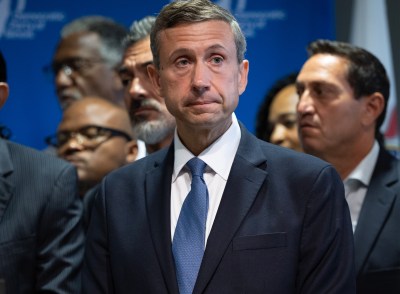MINNEAPOLIS—Defiant Democratic activists are rejecting warnings from veteran party strategists that left-wing positions on transgender rights and other visceral cultural issues are pushing away coveted voting blocs Democrats need to rebound in future elections.
During a Democratic National Committee business meeting here last week, the party’s LGBTQ Caucus dismissed focus group data from the centrist Democratic think tank Third Way showing that rank-and-file voters are repelled by gender-amorphous language progressive activists use to encourage transgender acceptance: “birthing person,” “chest feeding,” “LGBTQIA+,” etc. Blue collar voters, a bedrock Democratic constituency voting Republican in increasing numbers, are especially disturbed by this terminology, per the party-aligned Working Class Project.
“We literally have folks telling us that we cannot say the word ‘LGBTQ,’ we cannot say the word ‘cisgender,’ ‘transgender’—and by the way, not poll-tested, no research to back it up. Literally, just some feels from some folks in D.C.,” LGBTQ Caucus Chairman Sean Meloy told the group amid a discussion about boosting support for Democratic candidates in this year’s off-year contests in New Jersey and Virginia and the 2026 midterm elections. (Neither “LGBTQ” nor “transgender” made Third Way’s list; “cisgender” did.)
Leigh Finke, a transgender woman and Democratic member of the Minnesota House of Representatives, followed Meloy’s remarks with a polling presentation and analysis that acknowledged the voter backlash party strategists have identified, but Finke was otherwise dismissive. Finke said voters’ concerns—often driven by opposition to transgender women playing girls’ sports or minors receiving gender-altering health care—are the product of “rampant misinformation and disinformation” peddled by Republicans.
“There is nothing organic about the anti-trans movement in America. It is a national, coordinated, highly funded campaign for political purposes,” Finke said. “The good thing about attitudes about trans people is that they are extremely movable.” DNC activists were similarly skeptical that voters are receptive to President Donald Trump’s crime crackdown, with one presentation reported by Semafor’s David Weigel featuring a poll showing “voters overwhelmingly favor a ‘serious about safety’ approach over ‘tough on crime.’” The poll was fielded by a group that seeks to end mass incarceration.
Elected DNC members from across the country gathered in a downtown Minneapolis hotel last week for regularly scheduled sessions to discuss party operations, including voter turnout strategies, fundraising, messaging on key issues, potential changes to the Democratic Party’s policy platform and—of course–anxiety fueled by Republican majorities in Congress and Trump.
“As a big tent, we have conservative Democrats, we have centrists, we have progressives like me, and we have leftists,” DNC Chairman Ken Martin said during remarks to the party’s Midwestern Regional Caucus, whose members hail from states where Trump-led Republican inroads threaten Democratic prospects in presidential elections. “You don’t win elections by pushing people out of the conversation.” While the ideological diversity Martin heralded was most apparent in the Democratic split over Israel, his comments indicate he understands the party’s hurdles with various voting blocs.
Martin cut short the third and final day of the DNC meeting in response to the deadly August 27 mass shooting at Minneapolis’ Annunciation Catholic Church that killed two children who attend the institution’s K-8 school and critically injured several others. But during the first two days, DNC members held robust discussions about recovering from Trump’s impressive 2024 victory, recapturing the House of Representatives and the U.S. Senate, and restoring trust in a party suffering from low approval ratings.
Party activists largely agreed the best way forward is to talk to voters about Democratic plans to lower the cost of living, improve access to health care, and make the government responsive to voters. “The slogan of the Democratic Party should be the slogan of my former boss, Paul Wellstone, when he said: ‘We all do better when we all do better,’” Martin added during comments to the Midwestern Regional Caucus, citing Minnesota’s beloved Democratic senator, who died in 2002 while campaigning for reelection.
To be sure, this approach is strategically sound. Polls show voters care most about issues related to the economy and quality of life.
But over the past decade-plus, the Democratic Party has hemorrhaged support in key electoral battlegrounds because of cultural issues and issues with cultural overtones: abortion rights, border security, the Second Amendment, climate change, law enforcement, and—lately—expansive transgender rights. Led by Trump, Republicans have made major gains in Midwestern swing states and rural communities across the country because voters there tend to be uncomfortable with left-wing positions on these heartfelt issues (opinions on abortion rights are more mixed).
Yet Democratic activists tend to reject suggestions that cultural issues are a problem the party must address, much less overcome, in its effort to become more competitive, according to interviews The Dispatch conducted with DNC members. They largely insist that winning elections requires hyper-concentration on the economy—explaining to voters with more vigor both the Democratic agenda and, from their perspective, the unfairness of Trump’s policies and the financial hardship his administration is causing.
“What we need to do is refocus people on outcomes,” Oklahoma Democratic Party Chairman John Waldron said. “Why are we talking about transgender athletes when our rural public schools are suffering because we’re shoving all this money into the rich, private urban schools?” Earlier, during the Midwest Regional Caucus Meeting, Waldron told colleagues he was hoping to use what he argues is insufficient public school funding as an issue to drum up support for Democrats in his deep red state.
During a gathering of the DNC’s Rural Council, there was little discussion of cultural issues and the challenges left-wing positions pose for Democratic candidates. The antidote to Republican dominance in rural communities, speakers said during the meeting, is knocking on more doors and having more conversations with voters about the party’s fiscal agenda while avoiding cultural topics altogether. That’s how it seemed, at least, from their comments, including during a subsequent interview with leaders of the Minnesota Democratic Farmer-Labor Party’s Rural Caucus.
“They’re in part just not aware of what the Democratic Party does for farmers, for working people, for small business people,” caucus Chairwoman Theresa Keaveny told The Dispatch, responding to the question of why Democrats struggle in rural areas. “It’s a misconception that rural people have different culture and values than urban people,” added caucus member Julie Fryer.
When LGBTQ Caucus Chairman Sean Meloy was asked if voters uncertain about, or opposed to, broader acceptance of transgender people might never give Democrats a hearing on economic issues, he rejected the premise. The issue has only redounded to the benefit of Republicans because it symbolized to those voters that Democrats were not fighting hard enough for them. That explains the success of the Trump campaign’s “they/them” television advertisement, Meloy told The Dispatch.
“People who got scared by these ads—this othering of trans people—by the Republicans, they want someone who’s going to be fighting for them,” Meloy said. “It validated this misconception that Democrats weren’t going to be those fighters to unrig this economy. So that’s what we have to start talking about more.”







Please note that we at The Dispatch hold ourselves, our work, and our commenters to a higher standard than other places on the internet. We welcome comments that foster genuine debate or discussion—including comments critical of us or our work—but responses that include ad hominem attacks on fellow Dispatch members or are intended to stoke fear and anger may be moderated.
With your membership, you only have the ability to comment on The Morning Dispatch articles. Consider upgrading to join the conversation everywhere.